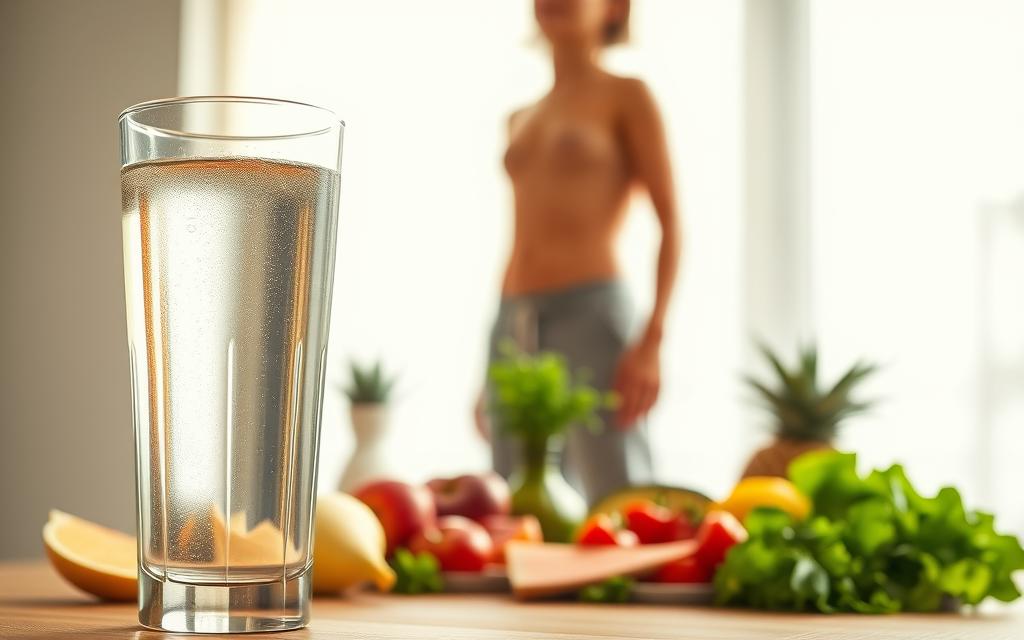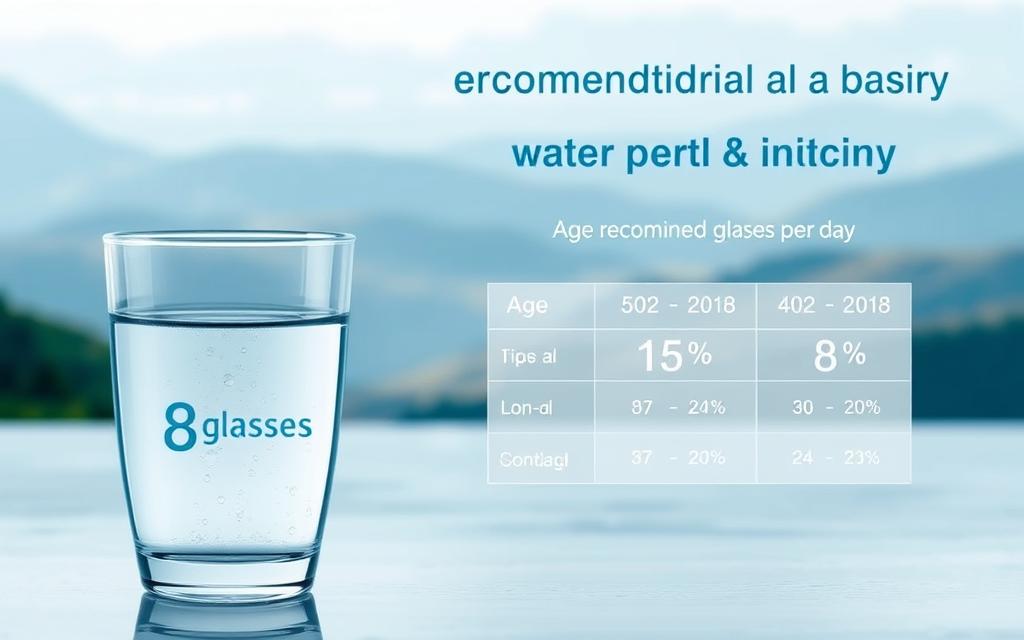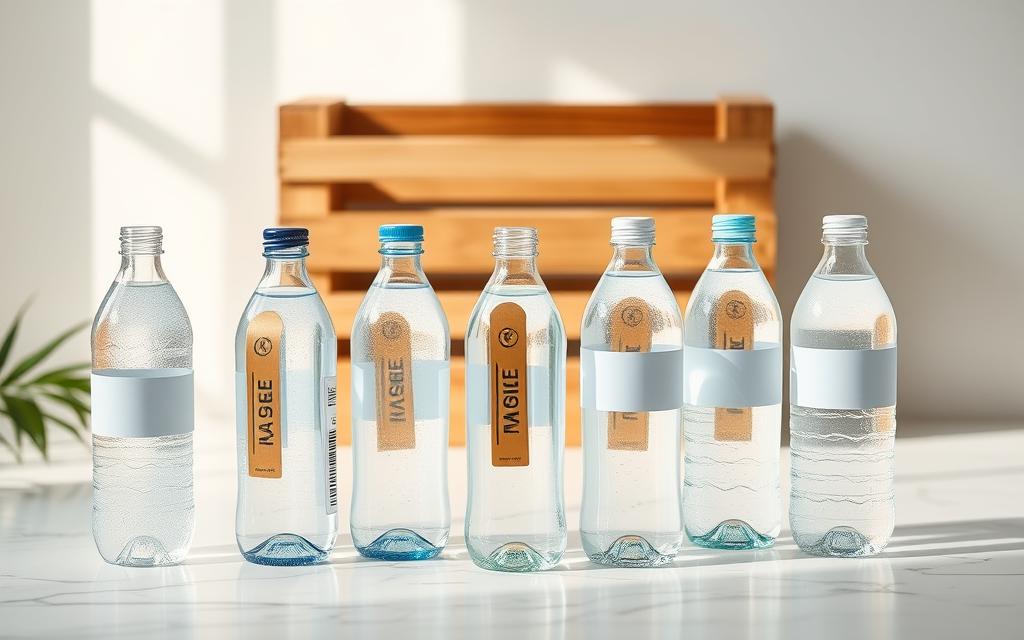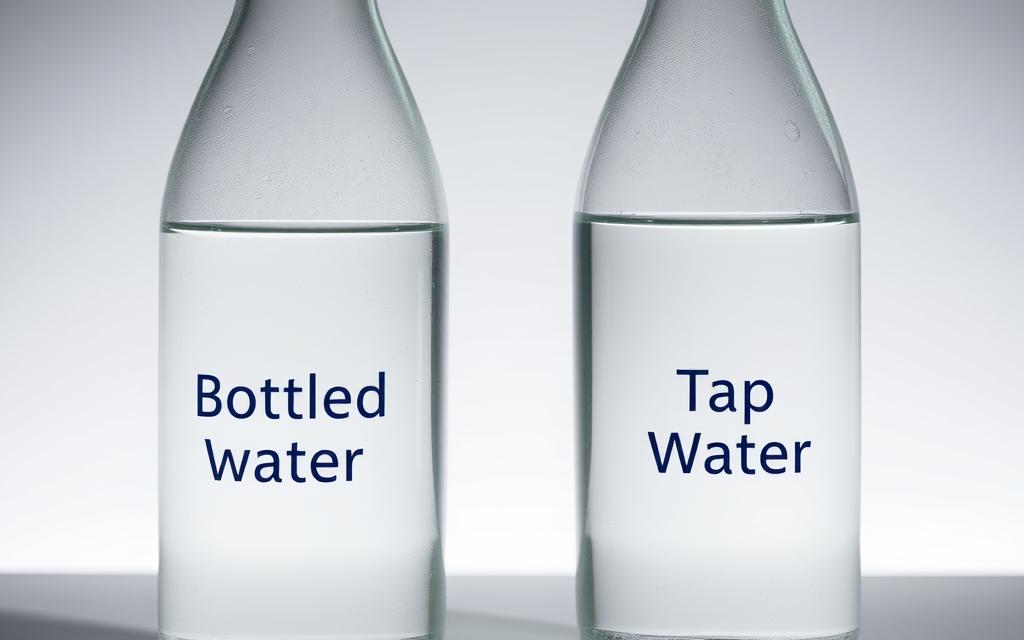Are you drinking enough water to keep your body running at its best? It’s not just about quenching thirst. It’s about keeping your health and performance at their peak.
The human body is a complex machine that needs water to work right. As we explore daily water intake for adults, we’ll uncover the science of staying hydrated.
Water is more than just a drink. It’s the fuel that powers every cell, keeps your body temperature right, and supports your body’s functions. I aim to share the key guidelines that change how you view hydration.
Key Takeaways
- Optimal daily water intake varies by individual needs
- Men typically require more water than women
- Hydration impacts overall health and body performance
- Activity level and climate affect water requirements
- Listening to your body is key for proper hydration
Why Hydration Matters for Adults
Water is essential for my body. It’s not just a suggestion to stay hydrated—it’s vital. Every part of me needs water to work right.

My need for water is more than just feeling thirsty. It’s key to my health and happiness. Let’s explore why staying hydrated is so important.
The Importance of Staying Hydrated
Water helps my body in many ways:
- It keeps my body temperature stable.
- It helps my joints move smoothly.
- It carries nutrients to my cells.
- It helps get rid of waste.
- It boosts my brain power.
Effects of Dehydration on My Body
If I don’t drink enough, my body pays the price. Dehydration can lead to big problems:
| Dehydration Symptom | Potential Impact |
|---|---|
| Fatigue | Less energy and less work done |
| Headaches | Cloudy thinking |
| Muscle Cramps | Worse physical performance |
| Dry Skin | Worse skin health |
Listening to my body and staying hydrated is essential for my health and performance.
Understanding Daily Water Intake Guidelines
Drinking enough water is key for my health. The National Academy of Medicine gives guidelines on how much water I should drink each day. These help me keep track of my water intake.
Experts have set up detailed guidelines for staying hydrated. These take into account many factors that affect my water needs.
Recommended Amounts by Health Organizations
The amount of water I should drink varies. Health experts say:
- Adult men: About 13 cups (3.7 liters) of water daily
- Adult women: Around 9 cups (2.7 liters) of water daily
Individual Factors Influencing My Hydration Needs
Several factors can change how much water I need:
| Factor | Impact on Water Intake |
|---|---|
| Age | Metabolic changes affect hydration needs |
| Physical Activity | More exercise means I need more water |
| Climate | Hot or humid weather means I need more water |
| Overall Health | Some health issues can change my water needs |
Remember, these guidelines are not one-size-fits-all. My body’s unique characteristics play a significant role in determining the right amount of daily fluid intake.
Listening to my body and understanding its specific hydration signals is key to maintaining optimal health.
How to Calculate My Daily Water Needs
Figuring out how much water you need each day is all about you. It’s not the same for everyone. Your body and lifestyle play big roles.
To find out how much water you should drink, look at a few important things. These things affect how much water you need to stay hydrated.
Using Body Weight as a Starting Point
I found a simple way to guess how much water I need. It’s based on my weight. Here’s the formula:
- Multiply my weight in pounds by 0.5 to 1 ounce
- For a 150-pound person, this means 75-150 ounces daily
- Adjust based on individual activity levels and health conditions
Factoring in Activity and Environment
My water needs change a lot depending on how active I am and where I am. Working out hard, being in hot places, or being at high altitudes means I need more water.
Things that affect how much water I drink include:
- Exercise intensity
- Ambient temperature
- Humidity levels
- Personal metabolism
People who exercise a lot or live in very hot places need a lot more water. This is different from those who are less active or live in cooler places.
Signs I Need More Water
As an adult, staying hydrated is key. I need to listen to my body’s signs. This helps me keep my hydration levels right and avoid health problems.
My body tells me when it needs water through different symptoms. Ignoring these signs can lead to serious dehydration.
Recognizing Symptoms of Dehydration
Dehydration can happen fast, even with a small water loss. I must watch for these important signs:
- Persistent fatigue and low energy levels
- Dark yellow or amber-colored urine
- Dry mouth and chapped lips
- Headaches and mild confusion
- Decreased urination frequency
When Thirst is a Good Indicator
Thirst isn’t always a good sign of how hydrated I am. Sometimes, I’m already dehydrated by the time I feel thirsty.
Pro tip: For optimal adult hydration needs, I should drink water consistently throughout the day, not just when feeling thirsty.
Some groups need to be extra careful about staying hydrated. This includes older adults, athletes, and those living in hot places. My hydration needs can change based on my activity, environment, and health.
My Hydration Needs During Exercise
When I’m working out, drinking enough water is key. It’s not just about drinking water. It’s about knowing what my body needs during exercise.
Staying hydrated is a big deal for adults who exercise. It’s important to plan how to replace lost fluids. This helps my body stay in top shape.
Pre-Workout Hydration Strategy
- Drink 16-20 ounces of water 2-3 hours before exercising
- Consume an additional 8 ounces 20-30 minutes before starting
- Check urine color to ensure proper hydration (pale yellow indicates good hydration)
During Workout Fluid Replacement
How much water I drink depends on how hard and long I work out. For sessions lasting over 60 minutes, I use drinks with electrolytes to replace lost minerals.
- Drink 7-10 ounces every 10-20 minutes
- Use sports drinks for intense workouts over an hour
- Monitor body signals and drink when feeling thirsty
Special Considerations for Hot Weather
Hot weather means I need to drink more water. I always carry extra water and listen to my body to avoid heat problems.
- Increase water intake by 25-50% in high temperatures
- Wear lightweight, breathable clothing
- Take frequent breaks in shaded areas
Remember: Proper hydration is key to maintaining performance and preventing heat-related illnesses during exercise.
Hydration and Diet: Foods That Help
Drinking water is just part of staying hydrated. What I eat also plays a big role. In fact, about 20% of our water comes from food.
Some foods are super good at keeping me hydrated. Here are some of the best ones:
Fruits with High Water Content
- Watermelon: 92% water, perfect for summer hydration
- Strawberries: Contains 91% water, packed with vitamins
- Cantaloupe: Offers 90% water content
- Peaches: Approximately 89% water
Vegetables That Support Hydration
- Cucumber: 95% water, extremely refreshing
- Lettuce: 96% water, great for salads
- Zucchini: 94% water content
- Tomatoes: Contains 94% water
But it’s not just fruits and veggies. Soups, broths, and yogurt also help keep me hydrated. Adding these foods to my diet helps meet my hydration needs.
Pro tip: Eating water-rich foods is an enjoyable way to supplement my water intake, even for those who find plain water hard to drink.
Tips for Drinking More Water Daily
Drinking enough water as an adult can be tough. But, with smart strategies, I can make it easy. Adult guidelines suggest finding fun ways to drink more water that match my life and taste.
Flavoring My Water Naturally
It’s important to make water taste good to hit my hydration goals. I can turn plain water into a tasty drink by adding fresh stuff:
- Sliced citrus fruits like lemon, lime, or orange
- Cucumber for a refreshing twist
- Fresh herbs such as mint or basil
- Berries for a subtle sweet flavor
Choosing the Perfect Water Bottle
Choosing the right water bottle can really help me drink more. I’ll look at these things when picking the best one:
| Bottle Type | Key Benefits |
|---|---|
| Insulated Bottle | Keeps water cold for hours |
| Large Capacity Bottle | Reduces refill frequency |
| Marked Bottle | Tracks daily water intake |
Smart Hydration Strategies
Here are some easy ways to drink more water:
- Set hourly reminders on my phone
- Drink a glass of water before each meal
- Keep a water bottle at my workspace
- Replace one sugary drink with water daily
Pro tip: Try different methods to find what works best for you.
My Daily Water Intake Tracking
Staying hydrated is more than just drinking water. Tracking your daily water can change your health and wellness. Now, technology offers new ways to monitor and boost your hydration.
Smartphones make tracking water intake easy. Many apps help you meet your hydration goals with little effort.
Top Hydration Tracking Apps
- Water Reminder: Sends personalized notifications
- Hydro Coach: Calculates individual water needs
- WaterMinder: Tracks intake with visual graphs
- Plant Nanny: Gamifies water drinking experience
Setting Effective Water Drinking Reminders
Creating a hydration routine needs smart reminders. I suggest using app features that:
- Customize notification frequencies
- Match reminders to your daily schedule
- Track progress with visual indicators
- Provide motivational encouragement
Pro tip: Choose an app that syncs with your smartphone and personal lifestyle for maximum effectiveness.
Consistent hydration is key to maintaining optimal health and energy levels.
Technology helps turn water tracking into a fun, rewarding part of my wellness journey.
The Role of Caffeinated and Alcoholic Beverages
Choosing the right drinks is key to staying hydrated as an adult. Not all drinks help keep our bodies hydrated. It’s important to know how different drinks affect our water intake.
Caffeine and alcohol can make staying hydrated harder. These drinks are popular, but they can mess with our body’s water balance.
Understanding Beverage Hydration Impact
- Caffeinated drinks like coffee and tea have complex hydration effects
- Alcohol can potentially trigger dehydration mechanisms
- Some beverages contribute to fluid intake, while others may counteract hydration
Caffeine’s Hydration Dynamics
Caffeinated drinks aren’t all bad for hydration. Drinking them in moderation can help with daily fluid needs. The key is understanding balance and moderation.
| Beverage Type | Hydration Impact | Recommended Limit |
|---|---|---|
| Coffee | Partial Hydration | 3-4 cups daily |
| Black Tea | Moderate Hydration | 2-3 cups daily |
| Alcohol | Dehydrating | 1-2 drinks maximum |
Balancing Beverage Choices
Water should be my main drink. For every caffeinated or alcoholic drink, I’ll drink an extra glass of water. This helps keep my body balanced.
“Hydration is about making smart choices, not eliminating enjoyable beverages entirely.” – Nutrition Expert
Knowing these tips helps me enjoy my favorite drinks while keeping my body hydrated.
Misconceptions About Water Intake
Finding out how much water adults should drink can be confusing. Many myths about staying hydrated are out there. Let’s clear up some of these myths and find out what’s true.
The “8 glasses a day” rule is a common piece of advice. But, it’s not supported by strong scientific evidence. Everyone’s body is different, and many things affect how much water we need.
Debunking the “8 Glasses” Myth
My body’s need for water isn’t the same for everyone. Several things can change how much water I need:
- Body weight
- Physical activity level
- Climate and environment
- Overall health status
“Hydration is personal. What works for one person might not work for another.” – Hydration Experts
Understanding Body’s Hydration Regulation
My body has its own way of keeping me hydrated. The kidneys help control water balance by filtering out extra water. Hormones like antidiuretic hormone (ADH) also play a part in this process.
Instead of following a set amount of water, I should pay attention to my body. Feeling thirsty, the color of my urine, and my energy levels are better signs of hydration than a fixed daily goal.
How Climate Affects My Water Needs
It’s important to know how the environment affects how much water we need. The climate greatly influences our hydration needs to stay healthy.
Our water needs change based on where we are. Different climates require different hydration plans to keep our bodies hydrated.
Seasonal Hydration Adjustments
In summer, we need more water because it’s hotter and we sweat more. Our bodies lose more fluids, so we must drink more.
- Hot weather can increase fluid loss by up to 2-3 cups per day
- Humid conditions accelerate dehydration
- Summer activities require more frequent water intake
Altitude and Humidity Challenges
High places and dry areas make staying hydrated harder. At high altitudes, our bodies work harder and lose moisture faster. We need to drink more water.
- Altitude over 8,000 feet increases water needs by 25%
- Dry climates require additional hydration strategies
- Breathing becomes more rapid, causing increased moisture loss
“Your body is your best hydration guide. Listen to its signals in different environmental conditions.” – Hydration Expert
Knowing how climate affects our hydration helps us stay healthy. We can adjust our water intake based on the environment.
Creating a Hydration Routine That Works for Me
Staying hydrated as an adult is more than just drinking water. It’s about finding a routine that fits your life. I’ve found that a consistent hydration plan can boost my health and energy. My aim is to make drinking water a natural part of my day, not a chore.
Adults need different amounts of water, but there are simple ways to get enough. I always have a water bottle by my desk and use phone reminders. By linking water to my daily habits, like drinking before coffee or after meetings, it’s easier to stay hydrated.
My routine includes drinking water at specific times. I start with a glass after waking, have one with meals, and during exercise. I also listen to my body and drink when I’m thirsty. I check the color of my urine to see if I’m drinking enough.
The key to a good hydration routine is being consistent and flexible. I don’t stress if I miss a few glasses. Instead, I focus on getting better and finding fun ways to drink enough water each day.



